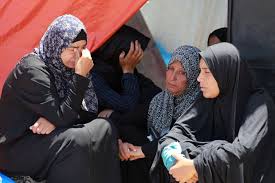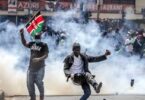RAFAH (AFP): Rafah residents reported intense artillery shelling and gunfire Thursday in Gaza’s far-southern city after Israel said it had seized a strategic corridor on the Palestinian territory’s border with Egypt.
The Israeli military launched its incursion into Rafah in early May despite international objections over the fate of Palestinian civilians sheltering there.
A strike over the weekend that started a fire and killed dozens in a displacement camp drew a wave of fresh condemnation, including a social media campaign with the slogan “All eyes on Rafah” that has been shared by tens of millions of users.
Military spokesman Rear Admiral Daniel Hagari announced Israel had taken “operational control” of the narrow border area, where he said troops had “discovered around 20 tunnels.”
Egypt, a longtime mediator in the conflict which has become increasingly vocal in its criticism of the Israeli operation, has rejected claims of smuggling tunnels running beneath the buffer zone.
“Israel is using these allegations to justify continuing the operation on the Palestinian city of Rafah and prolonging the war for political purposes,” a high-level Egyptian source was quoted as saying by state-linked Al-Qahera News.
Egyptian officials have said a potential Israeli takeover of Philadelphi could violate the two countries’ landmark 1979 peace deal, though there has been no official comment from Cairo since the military’s announcement.
On a visit in Beijing, Egyptian President Abdel Fattah El-Sisi called for increased humanitarian assistance to besieged Gaza, and reiterated his country’s longstanding opposition to “any attempt at forcing Palestinians to forcibly flee their land.”
Chinese leader Xi Jinping, meanwhile, called on Thursday for a “broad-based, authoritative and effective international peace conference” to address the war, as he hosted Arab leaders including El-Sisi.
On the ground in the Gaza Strip, witnesses reported fighting in central and western Rafah.
Witnesses also said Israeli forces had demolished several buildings in the city’s eastern areas where the Israeli incursion began on May 7, initially focusing on the vital Rafah border crossing, a key entry point for humanitarian aid.
An AFP correspondent reported artillery and gunfire in Gaza City’s southern neighborhood of Zeitun, in the territory’s north, where witnesses saw thick plumes of smoke rising over Jabalia refugee camp and Beit Lahia.
A steady stream of civilians have fled Rafah, transporting their belongings on their shoulders, in cars or on donkey-drawn carts.
Before the Rafah offensive began, the United Nations said up to 1.4 million people were sheltering there. Since then, one million have fled the area, the UN agency for Palestinian refugees, UNRWA, has said.
The Palestinian Red Crescent reported late Wednesday that two of its paramedics “were killed as a result of the Israeli occupation’s direct bombing” of an ambulance near Rafah.
The weekend Israeli strike and ensuing fire which tore through the camp for displaced Palestinians in Rafah, killed 45 people, according to Gaza officials and has prompted two days of discussions at the UN Security Council.
Israel has said it targeted a Hamas compound and killed two senior members.
In the wake of the strike, Algeria presented a draft UN resolution that “demands an immediate ceasefire respected by all parties” and the release of all hostages, but it was not clear when it would be put to a vote.
In a phone call with Palestinian president Mahmud Abbas on Wednesday, France’s Emmanuel Macron said Paris was “determined to work with Algeria” to ensure the council “makes a strong statement on Rafah.”
He also called on Abbas to “implement necessary reforms,” offering the “prospect of recognition of the state of Palestine.”
Decisions by Spain, Norway and Ireland to formally recognize the State of Palestine this week have sparked a debate over the issue, and Macron said it should take place at a “useful moment.”
Israel’s has killed at least 36,171 people in Gaza since October 7, mostly civilians, according to the Hamas-run territory’s health ministry.
Israel’s National Security Adviser Tzachi Hanegbi said the war could go on until the year’s end.
“We may have another seven months of fighting to consolidate our success and achieve what we have defined as the destruction of Hamas’s power and military capabilities,” Hanegbi said.
The United States has been among the countries urging Israel to refrain from a full-scale Rafah offensive because of the risk to civilians.
However, the White House said Tuesday that so far it had not seen Israel cross President Joe Biden’s “red lines.”
The New York Times and CNN, citing weapons experts and analysis of video from the scene of the weekend Rafah strike, reported that the bomb believed to have started the fatal fire was a US-made GBU-39 guided munition.
On Wednesday, US Secretary of State Antony Blinken called on Israel to quickly devise a post-war strategy for Gaza, stressing: “In the absence of a plan for the day after, there won’t be a day after.”







